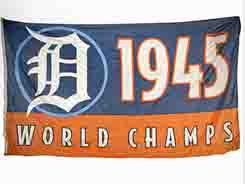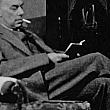
Tiger Baseball & WWII
GRHC - April 4th, 2012
Unlike today, professional baseball, including the Detroit Tigers, was severely affected during Word War II by travel restrictions and the loss of players who had either enlisted or been drafted.
Transcript
Today major league baseball hasn’t been affected by ongoing wars, but it was severely affected by World War II.
There were travel restrictions. Many trains were reserved for military personnel, or the shipment of war goods, so travel for teams was limited. Florida Spring training was out. The Detroit Tigers held spring training in 1945 in Evansville, Indiana, taking batting practice with cold, chapped hands, and shagging fly balls in a muddy outfield. They managed to schedule only four exhibition games for the entire spring.
Travel restrictions meant more doubleheaders; combined with an unusual spate of heavy rain in May meant that the Tigers would play no less than 35 doubleheaders during the 1945 season!
Rubber, an essential war material, was rationed. The baseball’s core, now made of synthetic rubber, led to a dead-ball era. Batting averages and home runs declined. There was so little hitting in a game between the Tigers and Philadelphia A’s on July 21, that the teams battled for 24 innings—to a 1-1 tie; the game was finally called because of darkness.
Of course, all teams sent players off to war. The Tigers’ all-star outfielder, Hank Greenberg, spent four years in the army. With the war’s end, he returned just in time to hit a grand-slam home run on the final day of the 1945 season to win the pennant for the Tigers, who went on to win the World Series against the Chicago Cubs.
Full Details
| Title | Tiger Baseball & WWII |
|---|---|
| Creator | GRHC |
| Keywords | WYCE; radio; Grand Rapids; Historical Commission; history; baseball; sports; Detroit; Word War II |
| Duration | 2:15 |
| Pubdate String | April 4th, 2012 |

 facebook
facebook